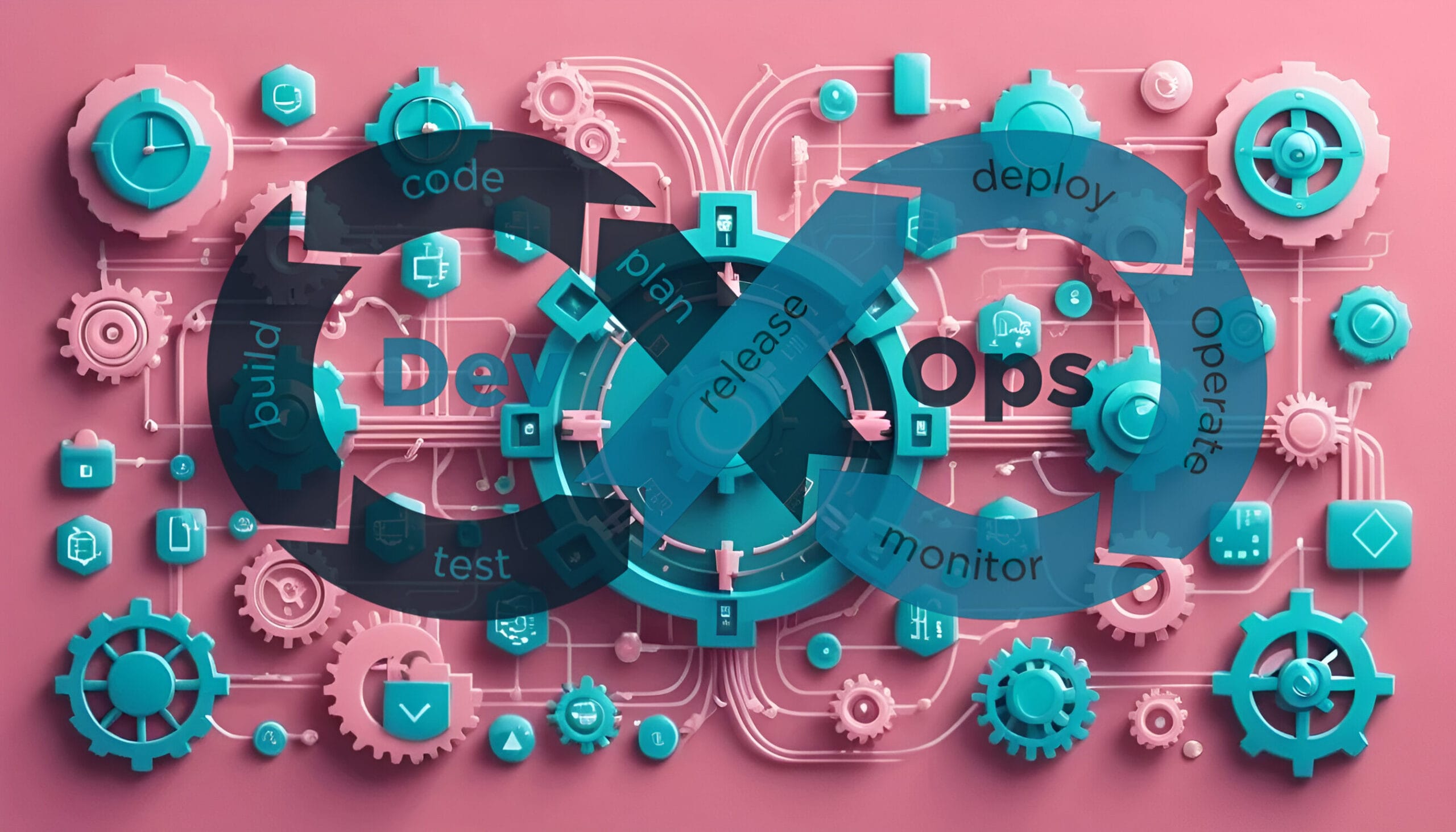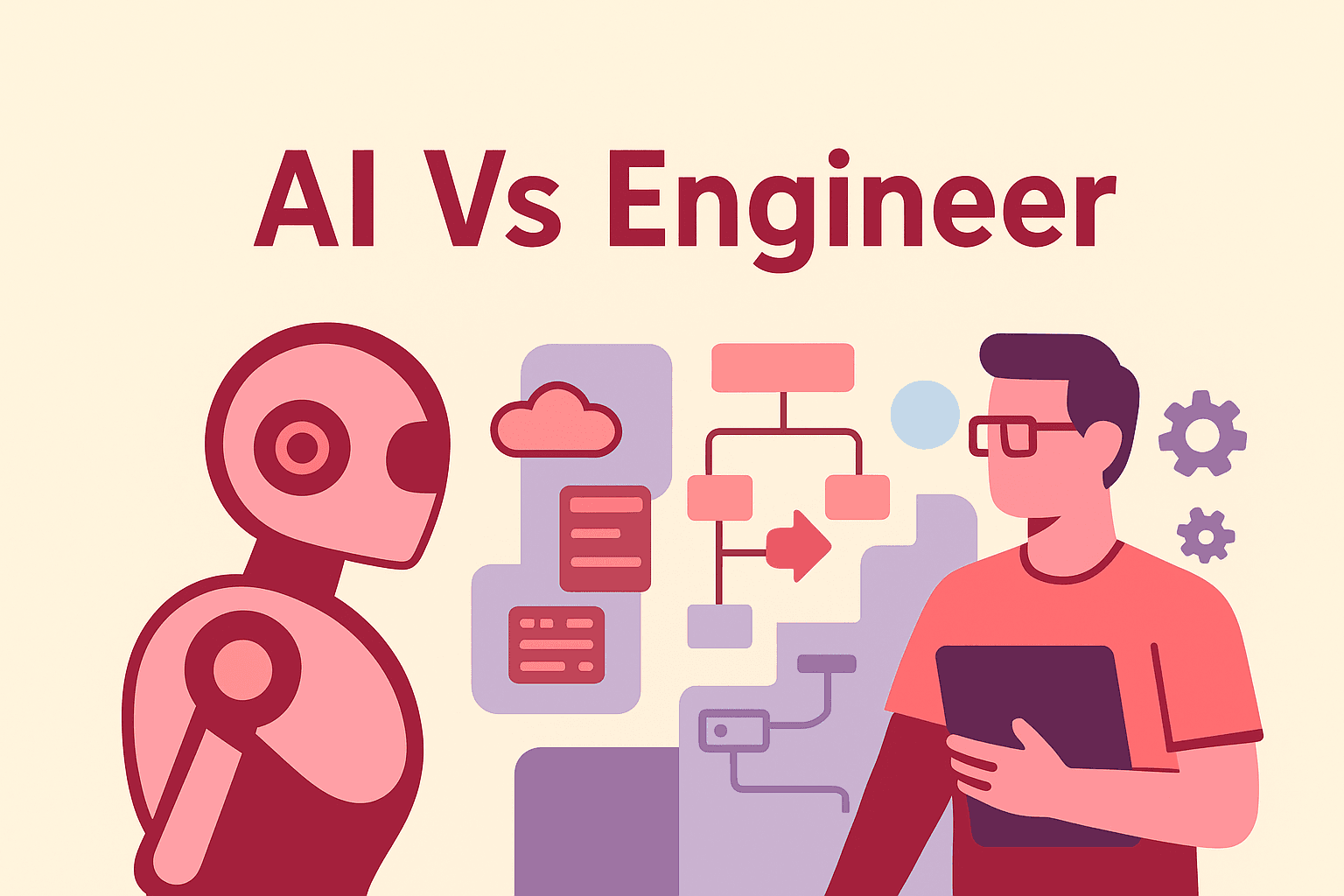In today’s fast-paced tech world, DevOps has emerged as a vital discipline that bridges the gap between software development and IT operations. Yet for many aspiring professionals, one question often lingers:
Is DevOps really that difficult?
This article breaks down that very question examining what makes DevOps both challenging and manageable. We’ll explore the core technical and soft skills you’ll need, whether coding is truly essential, and whether DevOps offers a solid long-term career path. By the end, you’ll walk away with a clear, grounded understanding of what DevOps involves and whether it’s the right direction for you.

What is DevOps, Really? Unpacking the Core Concept
It’s vital to understand that DevOps isn’t just a tool, a platform, or even a job title. It’s a set of practices, principles, and a cultural philosophy designed to dramatically shorten the software development lifecycle, enabling continuous and reliable high-quality software delivery.
At its core, DevOps breaks down traditional silos between development (writing code) and operations (deploying and maintaining maintaining it). It promotes cross-functional collaboration, shared ownership, open communication, and continuous feedback across every stage of the software delivery lifecycle.
The practical side of DevOps often revolves around the CI/CD pipeline (Continuous Integration/Continuous Delivery), an automated workflow that includes:
- Version Control: Managing code changes (e.g., Git, GitHub).
- Build Automation: Compiling code.
- Automated Testing: Ensuring code quality.
- Infrastructure as Code (IaC): Managing infrastructure via code (e.g., Terraform).
- Containerization & Orchestration: Packaging and scaling applications (e.g., Docker, Kubernetes).
- Deployment: Releasing software.
- Monitoring & Logging: Gaining system visibility (e.g., Prometheus, Grafana).
The key here is understanding how these diverse components integrate to create a streamlined, automated, and efficient software delivery workflow.
Is DevOps Difficult? Separating Perception from Reality
So, is DevOps difficult? The honest answer is: It depends heavily on your background, learning aptitude, and mindset.
For those transitioning from traditional sysadmin or pure development roles, DevOps can feel overwhelming at first. It requires a broad understanding of concepts, tools, and workflows that span both infrastructure and software development. A DevOps engineer isn’t just configuring servers or writing code they’re working across cloud platforms, automating deployments, orchestrating containers, and analyzing monitoring dashboards.
What Makes DevOps Challenging: The Steep Side of the Curve
- Rapidly Evolving Toolsets: The DevOps landscape is dynamic. New tools and best practices emerge constantly, making continuous learning an integral part of the job.
- Cross-Disciplinary Knowledge: This is one of the biggest hurdles. DevOps demands a solid foundation across several domains software development, system administration, networking, cloud computing, and cybersecurity. It’s like becoming a polyglot in the diverse languages of modern IT infrastructure.
- High Responsibility & Stakes: DevOps engineers are on the front lines, directly responsible for the stability and uptime of critical production systems. Pressure to resolve issues quickly is immense, as your work directly impacts business operations.
- Complex Troubleshooting: Debugging a CI/CD pipeline or a Kubernetes cluster isn’t straightforward. It requires systematic analysis and the ability to correlate information across various logs and systems.
- The Culture Shift: Beyond technical complexities, embracing the DevOps culture collaboration, communication, and a proactive mindset can be challenging for organizations and individuals used to traditional, siloed approaches.
What Makes DevOps Manageable: Conquering the Challenge
Despite these challenges, DevOps is far from unconquerable. Many aspects make it an accessible and rewarding field:
- Abundant Learning Resources: The DevOps community is vibrant, offering a wealth of free and paid tutorials, comprehensive documentation, and active online communities.
- Modular Learning Path: You don’t need to learn everything at once. Start with foundational concepts like version control and scripting, then gradually progress to CI/CD, cloud, and orchestration. This modular approach allows for incremental skill building.
- Practicality Over Pure Theory: Hands-on practice is paramount. Real-world projects, even small personal ones, often teach more than purely academic study. The field highly values practical application and problem-solving skills.
So, is DevOps difficult? Absolutely. It demands a continuous learning mindset and genuine curiosity. But it’s a conquerable kind of difficult. Don’t let the overwhelming number of tools intimidate you start with the principles: automation, continuous delivery, and feedback loops. Once you understand the why, the how (the tools) starts to make a lot more sense. And remember: every expert in DevOps was once a beginner too.
What Skills Are Needed for DevOps? The Essential Toolkit
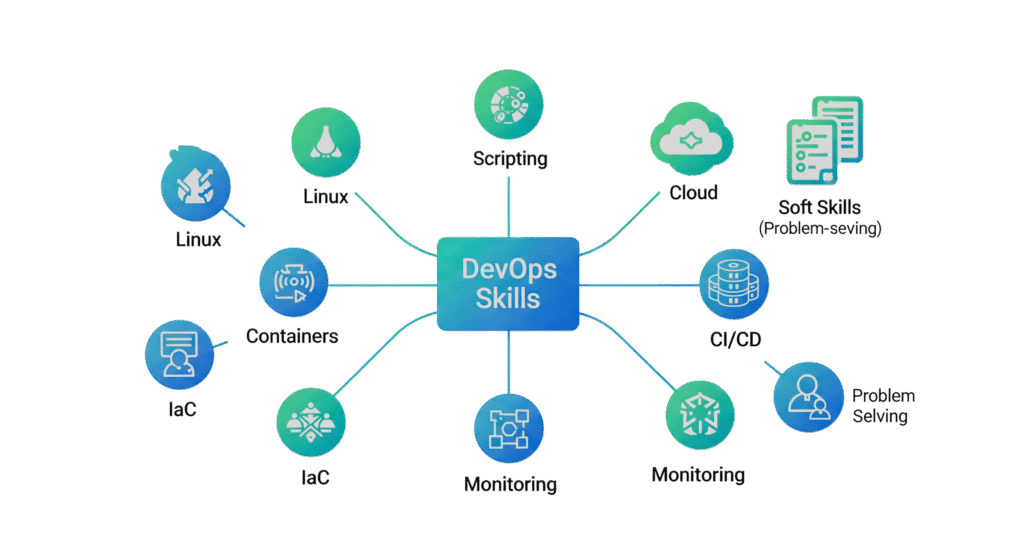
To thrive in a DevOps role, you’ll need a blend of technical skills and crucial soft skills.
Technical Skills: The Hands-On Arsenal
- Linux and System Administration: Most cloud and DevOps environments run on Linux. Proficiency in the command line, managing files, permissions, services, and basic networking are non-negotiable.
- Scripting Languages: Automation is the bedrock of DevOps. Bash is essential for shell scripting. Python is widely adopted for more complex automation, API interactions, and custom tooling due to its versatility. PowerShell is crucial for Windows environments.
- Version Control Systems: Git is the industry standard. Proficiency in its core commands, branching strategies, merging, and resolving conflicts is a must.
- CI/CD Pipeline Tools: Learn to configure and manage pipelines in at least one popular tool like Jenkins, GitLab CI/CD, GitHub Actions, or Azure DevOps. This often involves writing configurations in YAML or Groovy.
- Containerization and Orchestration:
- Docker: The industry standard for containerization. Understand how to build, run, and manage containers.
- Kubernetes: The de facto orchestrator for managing containerized applications at scale. Familiarity with Kubernetes concepts (Pods, Deployments, Services) and
kubectlcommands is increasingly core.
- Infrastructure as Code (IaC): Tools that provision and manage infrastructure programmatically.
- Terraform: Widely used for provisioning across cloud providers. Understanding HashiCorp Configuration Language (HCL) is key.
- Ansible: Excellent for configuration management and server setup. Knowledge of YAML for playbooks is essential.
- Cloud Platforms: Deep familiarity with at least one major cloud provider (e.g., AWS, Microsoft Azure, or Google Cloud Platform) and their core services is often expected.
- Monitoring and Logging Tools: Essential for visibility into system performance and health. Learn tools like Prometheus (metrics), Grafana (visualization), or the ELK Stack (Elasticsearch, Logstash, Kibana for logging).
- Networking Fundamentals: A basic understanding of networking concepts (IP addresses, DNS, load balancing, firewalls) is vital for debugging connectivity.
Soft Skills: The Collaborative Edge
Your ability to interact with people can make or break your success in DevOps.
- Problem-Solving and Critical Thinking: A large part of DevOps involves investigating complex issues and implementing solutions under pressure.
- Communication: As the bridge between diverse teams, you’ll need to communicate clearly, concisely, and with empathy. Whether you’re explaining complex technical concepts or mediating between priorities, strong communication is essential for effective collaboration.
- Adaptability and Continuous Learning: The tech landscape evolves rapidly. You must be genuinely curious and committed to continuous learning.
- Collaboration and Teamwork: DevOps thrives on shared responsibilities and feedback loops. Being a team player is essential.
- Empathy: Understanding the pressures and perspectives of both development (e.g., rapid feature delivery) and operations (e.g., system stability) is key to building effective processes.
Do DevOps Engineers Need to Know Coding? Here’s What You Should Know
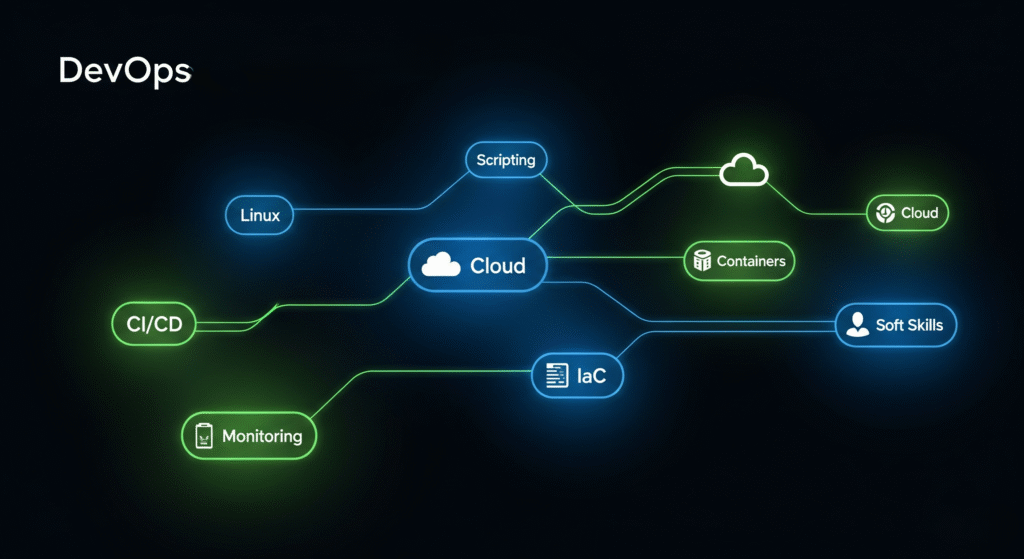
This is one of the most common questions, and it often causes confusion. The short answer is: Yes, basic to intermediate programming knowledge is essential. However, you don’t need to be a full-fledged software developer.
Your role isn’t about building complex applications. Instead, your coding skills will be leveraged for automation, configuration, and integration making disparate systems work seamlessly. Programming fundamentals also help you understand and troubleshoot application code written by developers, making you a more effective collaborator.
Where Coding Is Primarily Used in DevOps:
- Automation Scripts: Your bread and butter. You’ll write scripts (mostly in Bash, Python, or PowerShell) to automate repetitive tasks like builds, deployments, server configurations, and cloud resource management.
- CI/CD Pipeline Configurations: Understanding programming constructs helps you write more sophisticated, conditional, and robust pipelines in languages like YAML or Groovy.
- Infrastructure as Code (IaC): Tools like Terraform use HCL, which requires a programming mindset to define resources, use variables, and apply conditions. Ansible playbooks (YAML) leverage modules that can be Python-based.
- Monitoring and Alerting: You might write custom scripts (often Python) to collect specific metrics, parse logs, or trigger custom alerts.
- Debugging and Troubleshooting: When issues arise, you’ll often need to dig into application logs, code repositories, or even inspect application code. Basic programming literacy is crucial here.
- Custom Tooling and Integration: Occasionally, you might need to write small, custom tools or integrate systems using APIs. Python is particularly strong for this.
How Much Programming Do You Need to Know? A Practical Breakdown
You don’t need to master data structures and algorithms or complex object-oriented design. For most DevOps tasks, aim to understand:
- Variables and Data Types: How to store and manipulate information.
- Control Flow (Loops and Conditionals): How to make scripts perform actions repeatedly or conditionally.
- Functions: How to write reusable code blocks.
- Basic Error Handling: How to anticipate and gracefully handle issues.
- Working with APIs: How to make HTTP requests and parse responses (often JSON).
Don’t think of it as “coding like a developer.” Instead, truly grasp it as “coding to automate, configure, and connect.” Start with Python its readability and widespread use in automation make it an ideal entry point. Practice by automating simple, repetitive tasks you encounter. Can you write a script to back up a directory, check a service, or deploy a simple web app? These hands-on projects are invaluable for building confidence and practical skills effectively.
Is DevOps a Good Career? An In-Depth Look at Outlook, Salaries, and Growth
For many aspiring professionals, the ultimate question is: Is DevOps a good career choice? The short answer is an emphatic “Absolutely, yes!” DevOps has firmly established itself as a robust, in-demand, and highly rewarding career path.
1. High Demand and Exceptional Job Security
DevOps Engineers are needed now more than ever. As more companies embrace agile methodologies and cloud-native architectures, the demand for experts who can streamline development and operations has exploded. DevOps jobs are growing at an unprecedented rate globally.
Why It Matters: Businesses fundamentally need robust DevOps practices for faster time-to-market, higher quality software, and increased operational efficiency. Your ability to bridge these critical functions ensures your skills will always be highly sought after.
2. A Diverse and Evolving Skill Set
DevOps isn’t strictly coding or server management; it’s a blend of development, operations, security, and automation. You’ll gain hands-on experience with an impressive array of tools Jenkins, Docker, Kubernetes, Ansible, Terraform, and more. This inherent variety ensures your work remains engaging and provides a broad, adaptable skill base.
Why It Matters: The comprehensive skills you acquire make you an exceptionally versatile and invaluable team member, distinguishing you in the job market and providing resilience.
3. Great Salaries and Attractive Benefits
High demand directly translates into excellent compensation. Average salaries for DevOps Engineers are highly competitive, varying by location and experience:
- Junior: ~$75,000–$95,000 annually.
- Mid-level: ~$100,000–$130,000.
- Senior: Upwards of $150,000, with lead roles potentially much higher.
- In India: Entry-level roles often start between ₹6–8 LPA, with experienced engineers crossing ₹20–25 LPA.
Why It Matters: A DevOps career is both intellectually stimulating and financially lucrative, attracting top talent with competitive salaries and benefits.
4. Continuous Learning and Professional Growth
If you thrive on learning new things and keeping up with tech trends, DevOps is perfect. The tech landscape is constantly changing, challenging you to learn new tools, refine best practices, and master emerging technologies.
Why It Matters: Continuous learning ensures your job remains exciting and dynamic, guaranteeing your relevance in the ever-evolving tech world.
5. Extensive Career and Job Opportunities
DevOps career flexibility is remarkable. Your skills are highly transferable across diverse industries (finance, healthcare, retail, etc.). They also open doors to related high-paying fields like Cloud Engineering, Cybersecurity, Site Reliability Engineering (SRE), and Platform Engineering.
Why It Matters: The versatility and adaptability of DevOps skills mean this path presents a wealth of opportunities for long-term growth and robust job security.
6. High Job Satisfaction and Real Purpose
You’ll transform clumsy processes into efficient, automated workflows, directly improving team productivity, system stability, and user satisfaction.
Why It Matters: DevOps offers a profound sense of purpose. You witness the direct results of your efforts reduced downtime, faster releases, improved performance making the job deeply satisfying.
7. Involvement with Latest Technological Advancements
You’ll be at the forefront of innovation, working with the newest tools, platforms, and methodologies, from serverless computing to advanced AI/ML operations (AIOps).
Why It Matters: Being part of perpetual innovation keeps your work engaging, exciting, and ensures your resume is always current with cutting-edge experience.
8. Cross-Functional Collaboration is Key
You’ll work closely with diverse teams developers, operations, QA, security, and sometimes business stakeholders. This environment hones your communication, negotiation, and teamwork skills.
Why It Matters: You won’t be siloed. DevOps roles demand work across different functions, giving you a holistic understanding of the business and fostering strong interpersonal skills.
9. Excellent Remote Work Opportunities
Many DevOps tasks are conducive to remote work. With cloud infrastructure and remote management tools, flexible work policies are common.
Why It Matters: Telecommuting offers better work-life balance and the freedom to work from anywhere, appealing to those valuing location independence.
10. DevOps is the Future of IT
As companies move towards continuous delivery, cloud-native architectures, and agile methodologies, DevOps is becoming the standard. Its adoption is continuously expanding, making it an inherently future-proof career.
Why It Matters: Pursuing a DevOps career positions you in a profession that’s not only relevant today but increasingly vital tomorrow. Demand for skilled DevOps professionals is only set to increase.
The Unspoken Realities: What They Don’t Always Tell You
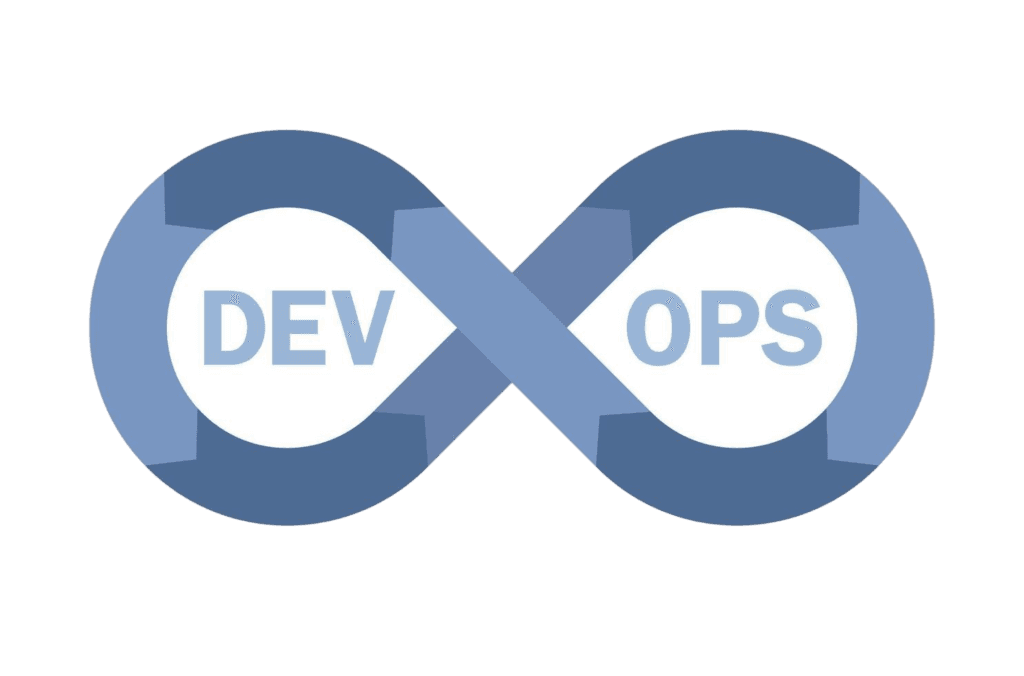
While the benefits are immense, a complete picture also acknowledges less glamorous realities.
1. Documentation is Just as Important as Code
You must document everything from day one. Well-documented infrastructure, pipelines, and processes are absolute lifesavers. Without proper documentation, your team will spend hours rediscovering solutions to previously solved problems. Onboarding new members also becomes an inefficient and frustrating ordeal. The more time and effort you put into documentation upfront, the easier your job and everyone else’s will be in the long run.
2. CI/CD Pipelines Are Never “Done”
Forget the idea of “set-and-forget.” CI/CD pipelines require continuous maintenance, updates, and relentless optimization. As a DevOps engineer, you must constantly adapt these processes to evolving industry standards, new security needs, and ever-changing business requirements. Business needs are always in flux, and your technical systems, especially the delivery pipeline, must rapidly respond to those changes.
3. Troubleshooting and Debugging is 80% of the Job
Most DevOps engineers, contrary to popular belief, spend the majority of their time not building new things, but on debugging. This means investigating failures, wrestling with deployment issues, fixing misconfigurations, diagnosing performance bottlenecks, and performing root cause analysis. Troubleshooting is, unequivocally, the core part of the role. That’s why you absolutely need to develop strong debugging skills, a methodical approach, and an almost intuitive understanding of how different systems fail. Mastering logs and monitoring tools will significantly ease your life and reduce stress.
4. The Unexpected Amount of Time Spent on Meetings
Communication is an enormous, often underappreciated, part of the DevOps job. It’s no wonder that a significant amount of your time will be spent in meetings: syncing with development teams, project planning sessions, sprint reviews, post-incident reviews (RCAs), and architectural discussions. Beyond attending, you’ll frequently need to document their conclusions, action items, and decisions. The cumulative time spent in collaborative discussions can be surprisingly substantial.
5. On-Call Responsibilities
This aspect heavily depends on the company you work for and its operational model, but in many organizations, DevOps engineers are part of an on-call rotation. This means being available outside of regular business hours to respond to critical incidents, production outages, or urgent alerts. While challenging, it’s also where you apply your troubleshooting skills under pressure and gain invaluable experience in managing live systems.
6. The Paramount Importance of Soft Skills (Again)
Being a truly good DevOps engineer isn’t just about your technical skills. At the end of the day, you are working with and influencing people. You need to persuade teams to adopt new tools, embrace the DevOps culture, and adhere to best practices. In DevOps (and broader roles like Platform Engineer or Automation Engineer), you fundamentally need to understand how things work together and “things” often include people, their workflows, and their resistance to change.
DevOps Career Snapshot
| Aspect | Summary |
| Difficulty | Challenging due to breadth of skills & continuous learning, but conquerable with a structured approach & hands-on practice. |
| Key Skills Needed | Linux, Scripting (Python, Bash), Git, CI/CD tools, Docker/Kubernetes, IaC (Terraform, Ansible), Cloud Platforms, Monitoring, Strong Soft Skills. |
| Need for Coding? | Yes, essential for automation & troubleshooting. Focus on scripting (Bash, Python) and understanding configuration languages (YAML, HCL), not complex app development. |
| Career Prospects | Excellent! High demand, competitive salaries, diverse opportunities, continuous growth, good job security, remote-friendly, high impact, and a future-proof field. |
| Realities | Expect heavy documentation, continuous pipeline maintenance, significant troubleshooting (80% of job), numerous meetings, and potential on-call duties. |
Final Take: Your Path Forward in DevOps
So, is DevOps difficult? It’s challenging demanding curiosity, commitment, and a willingness to solve complex problems. However, it’s also one of the most rewarding and impactful careers in tech. Its difficulty stems not from impossible individual tasks, but from the sheer breadth of knowledge required and the constant need for adaptation.
If you genuinely enjoy problem-solving, if the idea of automating processes excites you, and if you relish the thrill of keeping production systems healthy while deploying code rapidly, then DevOps is an excellent fit for your ambitions.
Don’t be paralyzed by the perceived complexity. Instead, embrace a practical approach: Start small, master one tool or concept at a time, and expand your skills incrementally. Leverage free online resources, actively join communities, contribute to open-source projects, and above all stay curious.
As we look ahead, even the landscape of automation is evolving rapidly with the advent of Artificial Intelligence; understanding how AI augments DevOps capabilities will be another critical frontier for professionals in this space. The world of DevOps is vast and ever-evolving, but it is unequivocally open to anyone willing to learn, adapt, and drive meaningful change. In a tech landscape increasingly dominated by cloud computing and CI/CD, DevOps isn’t just a career option it’s a critical necessity.

